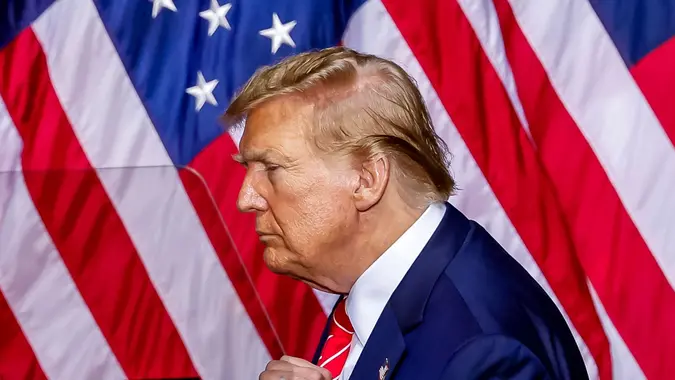How Trump vs. Biden Could Lower Your Banking Fees

Commitment to Our Readers
GOBankingRates' editorial team is committed to bringing you unbiased reviews and information. We use data-driven methodologies to evaluate financial products and services - our reviews and ratings are not influenced by advertisers. You can read more about our editorial guidelines and our products and services review methodology.

20 Years
Helping You Live Richer

Reviewed
by Experts

Trusted by
Millions of Readers
Bank fees are not a major campaign issue in the 2024 presidential election, or even a minor one. But there are differences between how President Joe Biden and former President Donald Trump plan to use the White House to deal with bank fees, and their decisions could save you money.
Although bank fees don’t exactly break the budget for most Americans, they can add up over time. The typical American wastes around $100 a year on bank fees. That figure can go much higher when you factor in credit card fees. Among bank fees, monthly maintenance fees are the most common, averaging about $14 a month, according to Experian. Other bank fees include the following:
- Out-of-network ATM fee.
- Overdraft fee.
- Nonsufficient funds fee.
- Stop payment fee.
- Check fees.
- Inactivity fee.
Biden has already unveiled proposals to lower bank fees, with mixed results. Trump has not said much on the issue, though during his first term as president he favored leaving bank fee decisions up to the banks themselves.
Here’s a look at how each candidate could either lower your banking fees, or leave them untouched.
Biden: Targeting Overdraft and Late Fees
As previously reported by GOBankingRates, the Consumer Financial Protection Bureau (CFPB) recently finalized a rule to slash credit card late fees to $8 from the current average of $32 as part of the Biden administration’s broader effort to crack down on junk fees.
The rule, proposed in March, would save consumers an estimated $10 billion a year. That adds up to an average annual savings of $220 for the more than 45 million Americans who are charged these late fees, according to a White House statement.
“For too long, surprise and hidden late fees have burdened consumers,” the statement said. “By closing the loophole that has allowed companies to charge these excessive late fees, today’s action will not only save consumers billions of dollars but promote fair and competitive markets.”
The wild card is whether the rule will ever get implemented. Last month, a Trump-appointed judge in Texas halted the Biden plan to decrease late fees on credit cards, The Hill reported.
U.S. District Judge Mark T. Pittman issuing a preliminary injunction preventing the rule from taking effect following a lawsuit against the CFPB led by the U.S. Chamber of Commerce and joined by banking and credit organizations. As The Hill noted, the suit alleges that the Biden rule violated several federal laws.
While that legal battle plays out, the Biden administration has also proposed a rule to reduce overdraft fees from around $35 to as low as $3. The rule, also proposed in March, would save consumers $3.5 billion a year, according to the White House.
Another Biden proposal is to prevent large banks from imposing junk fees when customers seek certain kinds of information.
“While small relationship banks pride themselves on customer service, many large banks erect obstacle courses and impose junk fees to answer basic questions,” CFPB director Rohit Chopra said in an October 2023 press release. “While the biggest banks have abandoned the relationship banking model, federal law still requires them to answer certain customer inquiries completely, accurately, and in a timely manner.”
Trump: Business Friendly
Bank fees do not seem to be a high priority for the Trump campaign, so the best way to gauge his position is to look at what he did as president. For the most part, Trump took a much more business-friendly approach than Biden.
According to a 2019 Washington Post article, the Trump administration reviewed a 10-year-old federal rule limiting the ability of banks to charge overdraft fees without customers’ permission. The idea was to overhaul regulations that the CFPB previously said saved consumers money, but which the banking industry wanted to revise to its benefit.
 Written by
Written by  Edited by
Edited by 

























